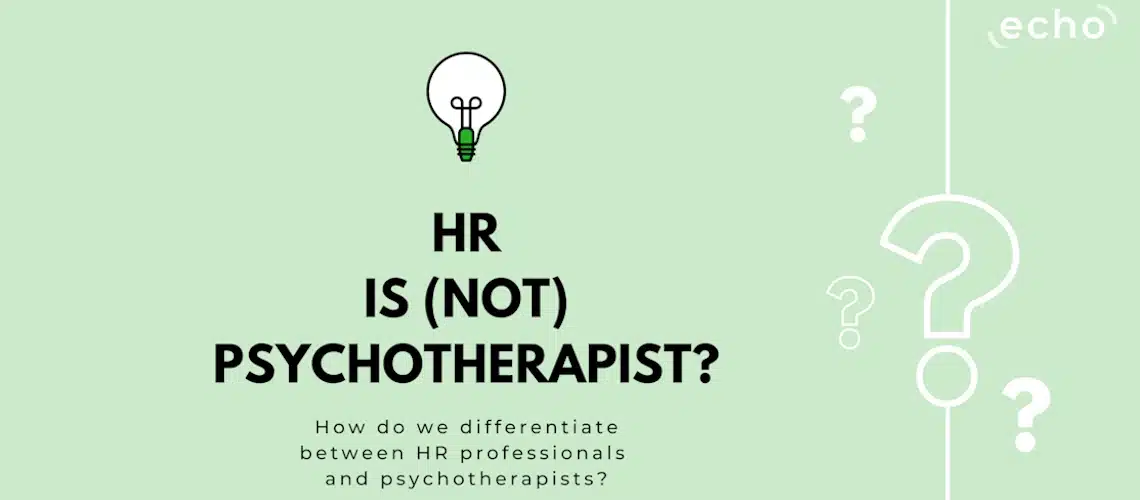Is HR a Psychotherapist?

Our HR representative, Zak, had the pleasure of attending a captivating discussion between an HR professional Nataliya Zabytivska and a psychologist Mariya Trakalo. The topic explored was “Is an HR Professional Essentially a Psychotherapist?”

Join 2000+ tech leaders
A digest from our CEO on technology, talent and hard truth. Get it straight to your inbox every two weeks.
No SPAM. Unsubscribe anytime.
Who is an HR professional?
Human Resources (HR) is a vital business function dedicated to managing people within an organization. This encompasses a range of responsibilities, from scouting and recruitment, onboarding new hires, facilitating learning and development, overseeing performance management, administering compensation and benefits, to eventually handling the offboarding process.
While HR’s primary role is guiding employees throughout their tenure at a company, this guidance isn’t limited to just supporting personnel. HR also plays a crucial role on the business side by creating new processes, spearheading automation, and more. Thus, HR isn’t just about interacting with people; it’s also about managing instruments, documents, numbers, and other critical operational facets.
Psychologist, Psychotherapist, and Psychiatrist: Are they the same or different?🤷
While HR professionals guide individuals in a work context, psychologists primarily discern what is considered normative or non-normative in the broader spectrum of a person’s life. For example, experiencing a midlife crisis at a certain age might be seen as normative. If a psychologist detects behavior that deviates from the norm, their primary objective is psychocorrection.
On the other hand, psychotherapists address human suffering, which can stem from experiences such as the loss of loved ones, divorce, job layoffs, and other significant life challenges. In essence, psychotherapists work with mentally healthy individuals who are undergoing distress or suffering. The primary tools utilized by both psychologists and psychotherapists include education, self-analysis, and the development of specific skill sets that their clients might lack.
Lastly, psychiatrists specialize in working with individuals diagnosed with mental illnesses. Their primary mode of treatment typically involves prescribing medications.
What if a person suffers at the workplace? Whom should they approach: HR or a Psychotherapist?🆘
In situations of workplace distress, it’s beneficial to consult both HR and a psychotherapist. Collaboratively, they can help identify the underlying causes of the individual’s suffering.
If the root of the issue pertains to workplace conditions or dynamics, it may fall within the responsibility of HR to address and rectify. On the other hand, if the distress is deeply embedded in the individual’s personal psychology, a psychotherapist can offer guidance and coping strategies. This support may even lead to the realization that a change in employment is necessary for the individual’s well-being
While both HR and Psychotherapists assist individuals, how do their methods and goals differ?🤷♂️🤷♀️
Firstly, HR professionals aim to find a balance that benefits both the employee and the organization. Their efforts are directed towards win-win solutions. The primary objective of HR, in terms of people management, is to maximize an employee’s potential in the workplace. This can be achieved through the implementation of business processes, policies, or specific working algorithms.
Psychotherapists are advocates for their clients, prioritizing their well-being above all else. This could even mean recommending that a client leave their job if it’s detrimental to their mental health. The goals of a psychotherapist are tailored to each individual client and might not align with the interests of the company where the client is employed.
Furthermore, when it comes to developing soft skills, HR tends to focus on the present. They assess whether an employee currently possesses certain skills or qualities that might warrant a promotion. Psychotherapists, however, don’t limit themselves to the present state of their client. They often delve into past experiences, even tracing back to childhood, to identify and address weaknesses, fostering growth and personal development.
How to Prevent 1-1 Meetings from Turning into Therapy Sessions🚫:
While 1-1 meetings are primarily meant to address work-related topics, it’s undeniable that external factors in an employee’s life can influence their work performance. There might be instances where a 1-1 meeting starts to feel like a therapy session, especially if the employee begins to share personal and sensitive information, potentially seeking advice.
It’s crucial to understand that HR professionals should refrain from offering therapeutic advice as it could exacerbate the situation. Instead, recommending that the employee seek professional psychotherapeutic help is a safer approach. One effective method to navigate such conversations is by employing the nonviolent communication technique developed by Marshall Rosenberg.
Nonviolent communication involves four key components:
- Observation: “I’ve noticed a decline in your KPIs. Lately, you haven’t been meeting your deadlines as consistently, and tasks seem to be taking you longer.”
- Feelings: “I’m concerned that this may be affecting team dynamics and the workflow within your group. Please know that my intention is to support and assist you.”
- Needs: “While I want to help, some issues might be outside of my expertise. I’d recommend seeking a professional who can offer guidance on matters beyond my competencies.”
- Requests: “How does this resonate with you? What are your thoughts?”
By using this approach, HR professionals can effectively communicate their concern and ensure that boundaries are maintained, all while making certain the employee feels heard and supported.
For a deeper and more comprehensive understanding of Marshall Rosenberg’s Nonviolent Communication, we recommend watching the video.👇

When Should You Approach an HR Specialist?🤔

It’s crucial to understand that HR typically has a bird’s-eye view of the company. This means they possess a holistic understanding of its inner workings and can offer guidance to employees aiming to achieve specific goals within the organization.
Option 1: If You Are a Manager
HR can assist you with various matters including:
- Understanding HR policies and procedures specific to your company.
- Salary reviews.
- Considerations for promotions.
- Identifying or creating a new position.
- Processes for new hires.
- Performance appraisals.
- Comprehensive performance management.
Option 2: If You Are an Employee
The scope of HR’s assistance may vary based on the model and specific HR role in your organization. However, in most companies, HR can provide guidance on:
- Benefits and compensation.
- Shifting to a different department.
- Clarifying organizational details.
- Pursuing promotions.
- Crafting a Personal Development Plan.
Remember, the role of HR can differ across organizations, so it’s always a good idea to check how your company’s HR department can best support you.
When Should You Approach a Psychotherapist?🧠

Work-Related Concerns:
1. Anxiety Related to the Workplace:
- Fear of one’s manager.
- Inability to assert oneself or say “no”.
- Hesitation or fear in making requests or asking for specific needs.
Often, these anxieties might be rooted in past events, childhood experiences, or traumas that influence present behavior in the workplace.
2. Unstable Communication Patterns:
- Frequently changing jobs (e.g., having changed 15 workplaces).
- Inability to stay at a single workplace for longer than three months.
- Holding rigid beliefs about work, such as believing it’s wrong to change jobs or feeling guilty about negotiating for a higher salary.
3. Anxiety About Job Transition: If someone feels overwhelmed or exceedingly anxious about the idea of leaving a company or changing jobs, it’s worth exploring the underlying causes of this anxiety.
Other Non-Work-Related Concerns:
- Relationship Challenges: Struggles in maintaining or fostering healthy interpersonal relationships.
- Career Uncertainties: Ambiguities or concerns about one’s career path or future.
- Parent-Child Dynamics: Issues stemming from relationships with one’s parents or with one’s children.
- Self-Esteem Issues: Struggling with self-worth or self-confidence.
- Generalized Anxiety: Persistent feelings of worry or stress not tied to any specific cause.
- Depression: Prolonged feelings of sadness, hopelessness, or lack of interest in daily activities.
If any of these concerns resonate, it’s beneficial to consult with a psychotherapist to gain insights, coping strategies, and potential resolutions.
In Summary:📝
Both HR professionals and psychotherapists play vital roles in assisting individuals, but their competencies and areas of focus differ. To optimize outcomes in both personal and professional arenas, it can be beneficial to consult both experts.
For climbing the career ladder, hard skills are undeniably important. However, developing soft skills, which are often best nurtured with the help of psychotherapists, is equally crucial. To align with a company’s objectives and gain a deeper understanding of its intricacies, reaching out to an HR specialist is recommended.
As one aspires to greater heights in their career, it becomes increasingly apparent that success is as much about mental well-being and personal growth as it is about job-specific competencies.
Tags: counseling, guidance, human resources, management, mental health.


